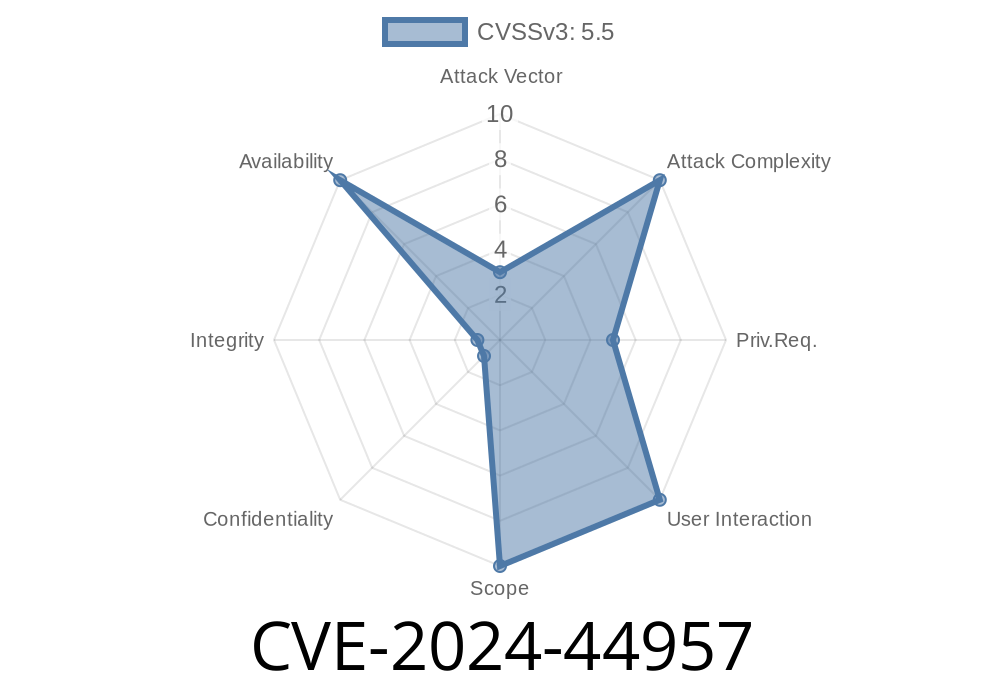The security world saw another important patch hit the Linux kernel, identified as CVE-2024-44957. This bug centers around a low-level synchronization issue that, while nuanced, could have severe implications for system stability and reliability, specifically when running Xen hypervisors. Let’s break down exactly what happened, why it mattered, and how it was fixed—plus provide you with references, and a peek at the code involved.
Background: What Is Xen and privcmd?
Xen is a widely-used hypervisor, popular for running multiple virtual machines efficiently. The privcmd interface allows userspace tools (like xl or xen-tools) to interact with the hypervisor.
Within this subsystem, “irqfd” allows notification of events (notably, interrupts) between the kernel and user-space via special file descriptors called eventfds.
The Problem: Mutexes and Spinlocks Don’t Mix
In the privileged Xen communication code, there was a locking issue centering around how asynchronous notifications are triggered for user-space.
The Issue
When an eventfd is released (closed by code running in user-space), the kernel triggers a function (eventfd_release()), which in turn wakes up threads waiting on that fd using wake_up_poll(). This call is *already* holding a special kind of lock: spin_lock_irqsave, which disables interrupts and spins in-place.
However, the irqfd handler logic also used a mutex (irqfd_data->lock) to guard its critical sections. This is dangerous, because mutexes can put threads to sleep—something fundamentally incompatible with spinlocks (which expect to never sleep).
If a sleeping lock (mutex) is called while holding a spinning lock, boom: the kernel can deadlock, freezing up processing until it’s rebooted. This is a show-stopping bug, especially in hypervisor code.
The Fix: Switching from Mutex to Spinlock
To resolve this, the kernel developers switched from using a mutex to a spinlock in the irqfd code path. Spinlocks don’t sleep—they "spin" until the lock is available, and that’s safe in contexts where sleeping is forbidden, like inside the callback from eventfd_release().
Before (Vulnerable)
static void irqfd_wakeup(/* ... */) {
mutex_lock(&irqfd_data->lock); // BAD: mutex here can sleep!
// ...critical section...
mutex_unlock(&irqfd_data->lock);
}
After (Patched)
static void irqfd_wakeup(/* ... */) {
spin_lock_irqsave(&irqfd_data->lock, flags); // GOOD: spinlock matches context!
// ...critical section...
spin_unlock_irqrestore(&irqfd_data->lock, flags);
}
By making this change wherever irqfd_data->lock was used in that codepath, any code entered while holding a spinlock—such as through wakeup calls deep inside the kernel—is now safe. No more risk of deadlock.
> Reference:
> Official Linux Kernel Patch Commit
Not a privilege escalation issue directly (not a root vulnerability).
- Reliability risk: A low-privileged or buggy userspace program could trigger EPOLLHUP by closing an eventfd at just the wrong time, causing the kernel to deadlock. On systems using Xen, all guests and the host could hang, requiring a hard reboot.
- Denial of service risk: Any user or program with access to eventfds and the privcmd interface could potentially freeze the machine.
Can This Be Exploited Remotely?
No—this is a local issue, but it could make servers unresponsive. In cloud or VM environments, any guest (with the right interface access) could inadvertently cause downtime.
Set up an eventfd and have it registered for notification.
3. Have one thread wait/poll on the eventfd.
4. Have another thread close (release) the eventfd at just the right time, as the kernel is handling irqfd wakeup.
This sequence, in the presence of the original mutex code, could deadlock the system kernel.
Note: Real-world exploitation would be unreliable (due to timing required) but deliberate attackers could script stress tests to increase chances of locking up the host.
Patch your kernel if you use Xen on Linux!
The fix is present from Linux 6.9+ and was backported to supported LTS branches.
Further Reading
- CVE-2024-44957 at cve.org
- Linux Kernel Patch Commit for this bug
- What’s a Spinlock? (LWN.net intro)
Summary
CVE-2024-44957 shows how even subtle locking mistakes can lead to serious kernel problems. By switching from a mutex to a spinlock, kernel maintainers have ensured safer handling of Xen’s privcmd irqfd wakes—eliminating the potential for disastrous deadlocks in a core Linux virtualization interface.
Stay secure: keep your system up to date, and know that even the smallest patches can make the biggest difference.
Timeline
Published on: 09/04/2024 19:15:30 UTC
Last modified on: 09/15/2024 17:55:56 UTC
